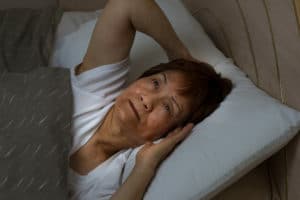
How Seniors’ Sleep Patterns Change
Shift in the Sleep-Wake Cycle
It is true that older adults tend to wake up earlier, which may be why people assume they need less sleep. Early rise times could be due to decreased melatonin production or increased sensitivity to their surroundings.
Seniors are also more likely to develop a circadian rhythm disorder known as “advanced sleep phase syndrome.” People with this syndrome become tired in the early evening and often wake up between 3 and 5 a.m. when they’d rather stay up late and sleep in. This can cut into someone’s social life and even cause sleep deprivation if they try to fight their natural urge to fall asleep.
Scientists aren’t sure what causes this shift, but genetic predisposition seems to play a role.
Decreased Quality of Sleep
In addition to falling asleep and waking up earlier, seniors also get less satisfying sleep than the rest of us. They spend less time in the rapid eye movement (REM) cycle where the body is relaxed and dreams take form. Older people also wake up three to four times during the night on average.
Other Factors That Can Affect Seniors’ Sleep
Insomnia
Sometimes insomnia is the direct result of a physical or mental problem. Many diseases and disorders can keep seniors up at night, including:
- Cardiovascular disease
- Lung disease
- Kidney disease
- Restless leg syndrome
- Periodic limb movement disorder
- Parkinson’s disease
- Alzheimer’s disease and other dementias
- ALS (Lou Gehrig’s disease)
- Anxiety
- Depression
Curing insomnia may be as simple as changing medications, decreasing a dose or taking a pill in the morning instead of at night. However, some medications seniors need to manage their symptoms also end up causing insomnia. Common culprits include:
- Alpha-blockers
- Angiotensin II-receptor blockers (ARBs)
- Angiotensin-converting enzyme (ACE) inhibitors
- Beta-blockers
- Cholinesterase inhibitors
- Chondroitin
- Corticosteroids
- Glucosamine
- H1 antagonists
- Selective serotonin reuptake inhibitors (SSRIs)
- Statins
Pain
Pain is useful for alerting us to new medical issues, but chronic pain during the night only causes seniors to toss and turn, unable to find a comfortable position. Arthritis, osteoporosis and gastrointestinal problems are common sources of nighttime pain.
Nocturia
Nocturia, or frequent urination throughout the night, prevents seniors from falling into deep REM-cycle sleep. An enlarged prostate and diabetes are two typical causes of nocturia in seniors.
Sleep Apnea
Seniors are more likely to develop sleep apnea than younger adults. This increased risk could be due to natural brain changes and an increase in the fatty tissue around the neck and tongue.
People with sleep apnea stop breathing in the middle of the night for as long as 10 to 30 seconds at a time. This typically happens many times within one night. The body will startle once it realizes the brain has no oxygen, waking the person out of deep sleep.
Sleep apnea is dangerous for many reasons, including drowsiness during the day and increased risk of high blood pressure, heart attack and type 2 diabetes.
Maintaining Your Health at A.G. Rhodes Health & Rehab in Atlanta and Marietta, GA
Seniors have many unique health concerns besides sleep quality. If you are in need of long-term care, short-term recovery, therapy or rehabilitation, the friendly caregivers at A.G. Rhodes can help. We offer:
- Assistance with activities of daily living
- Rehabilitation gyms
- Physical therapy
- Speech therapy
- Aquatic therapy (Atlanta location only)
- Horticultural therapy
- Music therapy
- And much more!
If you’re interested in signing up for one of our senior programs, contact us today at 877-918-6413.
Resources:
- https://www.agingcare.com/articles/sleep-and-aging-133153.htm
- https://stanfordhealthcare.org/medical-conditions/sleep/advanced-sleep-phase-syndrome.html
- https://www.verywellhealth.com/advanced-sleep-wake-phase-disorder-diagnosis-and-treatment-3014809
- https://www.aplaceformom.com/planning-and-advice/articles/insomnia-for-seniors
- https://medlineplus.gov/ency/article/004018.htm
- https://www.aarp.org/health/drugs-supplements/info-04-2013/medications-that-can-cause-insomnia.html
- https://www.nhlbi.nih.gov/health-topics/sleep-apnea
- https://familydoctor.org/sleep-changes-in-older-adults/

